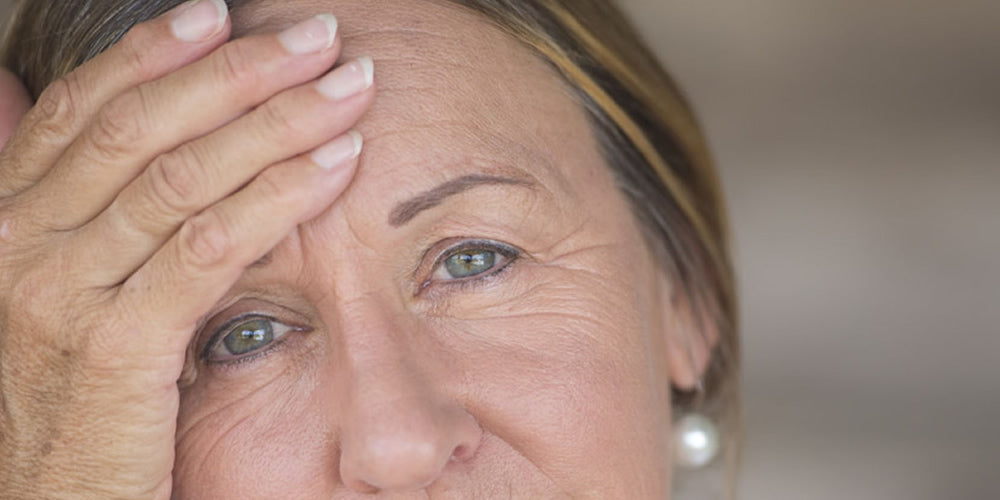The Menopause and hair loss
24May

For almost all women the menopause will affect the hair on your scalp in some way. Symptoms of menopause and hair loss can differ but they usually include dryness, dullness, increased shedding, thinning and changes in the hairline (some women may even start to notice facial hair appearing).
The average age for the onset of menopause is 50 but changes in your hair can start long before then and can be very hard to counteract. Of course we don’t expect to have the same luscious hair as when we were 21 but the menopause can accelerate the cause of hair problems and is similar to the early stages of male pattern baldness.
Most women notice a reduction in the volume of their hair, with each hair looking and feeling thinner. There may also be a change in your frontal hairline or around the temples and have increased hair fall. This doesn’t happen overnight however, it is a more gradual process. The main causes of these symptoms on your hair during menopause is down to a reduction in estrogen levels. Estrogen levels affect a lot of elements in the body, your menstrual cycle, sexual arousal, mood, appetite, skin and hair growth. A lot of women find their hair won’t grow as long as before, this is because estrogen keeps your hair in the growing stage. The longer the growing stage the longer your hair can grow. When the growing stage is shortened you may find your hair will shed before it reaches the level it normally would.
Menopause also increases androgen levels (male hormones), which are found in women as well as men but at much lower levels. This increase caused by the menopause can trigger thinning of the hair and encourage the growth of facial hair. The androgens won’t decrease the amount of hair on your head but will make each hair finer and shorter which will make your hair look like it is lacking in volume.
Hormone Replacement Therapy (HRT) is used to restore estrogen levels to what they were before the menopause which can help alleviate the symptoms, including helping with hair thinning and hair loss. Studies on HRT however, have shown to increase the chance of breast cancer, heart problems, uterine cancer and mood swings amongst others so it is important to weigh up the pros and cons with your doctor before committing to taking HRT. Remember your health is more important than your hair so this should be your priority. Shampoos and treatments like the ones Reseed have developed, could be a great step in encouraging your hair to grow thicker and stronger and help prevent hair loss and receding hairlines if you are worried about the risks and do not want to take HRT.
The average age for the onset of menopause is 50 but changes in your hair can start long before then and can be very hard to counteract. Of course we don’t expect to have the same luscious hair as when we were 21 but the menopause can accelerate the cause of hair problems and is similar to the early stages of male pattern baldness.
Most women notice a reduction in the volume of their hair, with each hair looking and feeling thinner. There may also be a change in your frontal hairline or around the temples and have increased hair fall. This doesn’t happen overnight however, it is a more gradual process. The main causes of these symptoms on your hair during menopause is down to a reduction in estrogen levels. Estrogen levels affect a lot of elements in the body, your menstrual cycle, sexual arousal, mood, appetite, skin and hair growth. A lot of women find their hair won’t grow as long as before, this is because estrogen keeps your hair in the growing stage. The longer the growing stage the longer your hair can grow. When the growing stage is shortened you may find your hair will shed before it reaches the level it normally would.
Menopause also increases androgen levels (male hormones), which are found in women as well as men but at much lower levels. This increase caused by the menopause can trigger thinning of the hair and encourage the growth of facial hair. The androgens won’t decrease the amount of hair on your head but will make each hair finer and shorter which will make your hair look like it is lacking in volume.
Hormone Replacement Therapy (HRT) is used to restore estrogen levels to what they were before the menopause which can help alleviate the symptoms, including helping with hair thinning and hair loss. Studies on HRT however, have shown to increase the chance of breast cancer, heart problems, uterine cancer and mood swings amongst others so it is important to weigh up the pros and cons with your doctor before committing to taking HRT. Remember your health is more important than your hair so this should be your priority. Shampoos and treatments like the ones Reseed have developed, could be a great step in encouraging your hair to grow thicker and stronger and help prevent hair loss and receding hairlines if you are worried about the risks and do not want to take HRT.

